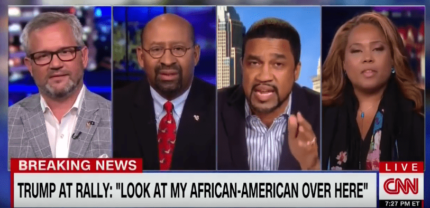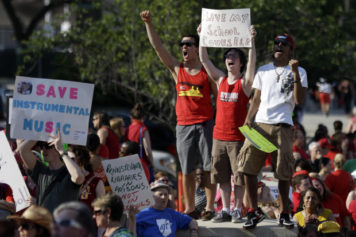Philadelphia school superintendent William R. Hite Jr. sent a shockwave through the city yesterday, stunning already heavy-hearted parents and students by announcing that schools there may not open next month unless the school district gets an additional $50 million by next Friday.
At a press conference, Hite looked into the cameras and said, give us more money or else—the district’s 218 schools might not open on Sept. 9 as scheduled, or they might open only for half a day, or only some schools might open.
“Without the funds to restore crucial staff members, we cannot open functional schools, run them responsibly or provide a quality education to students,” Hite said in a statement to the school community. “I am deeply dismayed that we are here today, facing these circumstances. Our students are the most important part of this equation and it is both saddening and frustrating to be in the position of telling them and their families that I do not know when their education will resume. They did not create these circumstances, yet they will be most impacted by any delay.”
The funding woes in Philadelphia, the nation’s eighth-largest district, have been ongoing for months, culminating with the district staring at a $304 million shortfall in June. At that time, Philadelphia shocked the nation when it fired 3,859 district employees, including 127 assistant principals and nearly 600 teachers, including many arts and music teachers and sports coaches—effectively wiping out the district’s extracurricular offerings.
In a stark illustration of a state’s disturbing priorities, Pennsylvania was forcing the Philadelphia schools to open in the fall without new books, paper, clubs, counselors, librarians, assistant principals, secretaries, sports, art and music, while at the same time the state found enough money to build a $400 million prison just outside the city.
While observers use words like “draconian” and “devastating” to describe the cuts, the blows to the Philadelphia schools keep coming: With 33 percent of its 200,000 students in charter schools, in March the district decided to close about 30 underused schools.
In June, state lawmakers were able to whittle down the $304 million budget gap by about $120 million, while the city pledged an additional $60 million. Mayor Michael Nutter said yesterday that the remainder was supposed to come through labor contract concessions from the teachers’ union.
“Time is running out,” Nutter said.
Philadelphia Federation of Teachers President Jerry Jordan said the union had voiced concerns about on-time openings for months, and that educators have already made personal and financial sacrifices.
“The district’s current contract proposals will not create better schools,” Jordan said in a statement. “They will cause a mass exodus of high quality educators and a deterioration of teaching and learning conditions in our schools for years to come.”
Though Mayor Nutter backs a plan to borrow $50 million for the schools—a loan that would be backed by extending a city sales tax increase that was supposed to be temporary—the state lawmakers signed off on the extension, but the city council left for the summer without approving it.
The city council won’t be returning until later in September after the Sept. 9 school opening.
“We started our budget process with a $304 million shortfall. We have only been promised $112 million,” Hite said. “I want to be clear about why the $50 million matters now: $50 million allows us to tell parents that when their child is walking through the hallways, eating lunch or at recess, an adult will be supervising them. It allows us to tell parents that counselors will be available to serve children in our largest and neediest schools, and that an assistant principal will be on hand to resolve any disciplinary issues that keep children from learning. It will allow the principal to leave the office to support staff and address issues in other parts of the school. No principal can run a 3,000-student high school – much less a 400-student elementary school – on their own. They need support, and we have an obligation to provide them with the staff and resources they need. Parents also need reassurance that a school has what it needs to serve their child…I hope that we can find a swift resolution to this funding matter for the sake of our students and families.”

